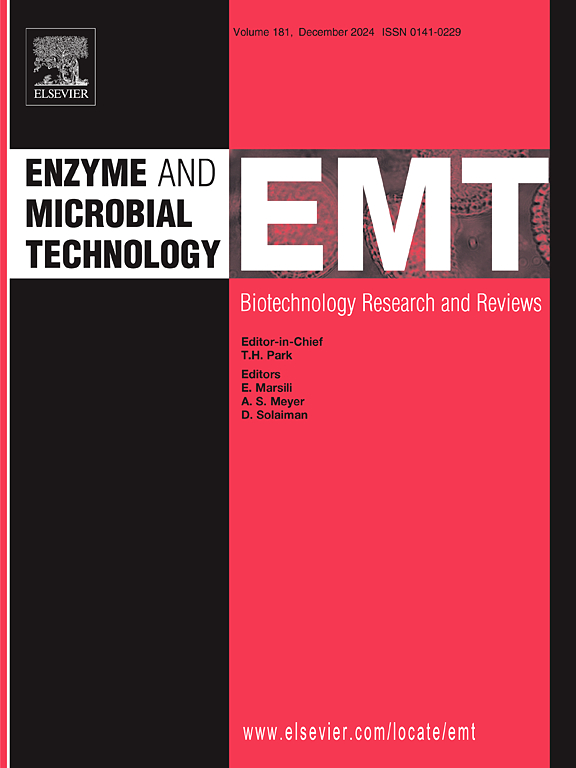cspA基因对糖多孢子虫生长发育及丁烯基旋糖素合成的影响
IF 3.7
3区 生物学
Q2 BIOTECHNOLOGY & APPLIED MICROBIOLOGY
引用次数: 0
摘要
冷休克蛋白(CSPs)是微生物中普遍存在的一类在低温条件下可快速诱导的蛋白质。作为RNA的分子伴侣,它们与单链核苷酸结合,防止形成复杂的二级结构。这有助于有效的翻译和基因表达调控。本研究通过代谢工程技术对cspA基因进行了开创性的研究,揭示了cspA基因在糖多孢菌生长发育和丁烯基旋糖蛋白生物合成中的重要生物学作用。通过比较蛋白质组学和靶向代谢组学分析,本研究阐明了由冷休克蛋白CspA的增加引起的代谢途径改变。此外,它还提供了CspA影响S. pogona生长、发育和丁烯基- spinsyn产生的调控机制的初步见解。本研究结果极大地促进了我们对丁烯基-自旋蛋白生物合成途径合理优化的理论认识。它们还为其他放线菌提供了有价值的指导,这些放线菌旨在通过过度表达cspA基因来增强对恶劣环境的适应能力。本文章由计算机程序翻译,如有差异,请以英文原文为准。
The effect of the cspA gene on growth development and butenyl-spinosyn biosynthesis in Saccharopolyspora pogona
Cold shock proteins (CSPs) represent a universal class of proteins in microorganisms, rapidly inducible under low temperature conditions. As molecular chaperones for RNA, they bind to single-stranded nucleotides, preventing the formation of complex secondary structures. This facilitates efficient translation and gene expression regulation. This investigation pioneers the study of the cspA gene through metabolic engineering techniques, to uncover its critical biological roles in the growth and development of Saccharopolyspora pogona and in butenyl-spinosyn biosynthesis. Employing comparative proteomic and targeted metabolomic analyses, this research elucidates the metabolic pathway alterations prompted by the augmented presence of the cold shock protein CspA. Additionally, it offers initial insights into the regulatory mechanisms by which CspA affects S. pogona's growth, development, and butenyl-spinosyn production. The outcomes of this study significantly advance our theoretical understanding of the rational optimization of butenyl-spinosyn biosynthetic pathways. They also provide valuable guidance for other actinobacteria aiming to boost their resilience to harsh environments by overexpressing the cspA gene.
求助全文
通过发布文献求助,成功后即可免费获取论文全文。
去求助
来源期刊

Enzyme and Microbial Technology
生物-生物工程与应用微生物
CiteScore
7.60
自引率
5.90%
发文量
142
审稿时长
38 days
期刊介绍:
Enzyme and Microbial Technology is an international, peer-reviewed journal publishing original research and reviews, of biotechnological significance and novelty, on basic and applied aspects of the science and technology of processes involving the use of enzymes, micro-organisms, animal cells and plant cells.
We especially encourage submissions on:
Biocatalysis and the use of Directed Evolution in Synthetic Biology and Biotechnology
Biotechnological Production of New Bioactive Molecules, Biomaterials, Biopharmaceuticals, and Biofuels
New Imaging Techniques and Biosensors, especially as applicable to Healthcare and Systems Biology
New Biotechnological Approaches in Genomics, Proteomics and Metabolomics
Metabolic Engineering, Biomolecular Engineering and Nanobiotechnology
Manuscripts which report isolation, purification, immobilization or utilization of organisms or enzymes which are already well-described in the literature are not suitable for publication in EMT, unless their primary purpose is to report significant new findings or approaches which are of broad biotechnological importance. Similarly, manuscripts which report optimization studies on well-established processes are inappropriate. EMT does not accept papers dealing with mathematical modeling unless they report significant, new experimental data.
 求助内容:
求助内容: 应助结果提醒方式:
应助结果提醒方式:


